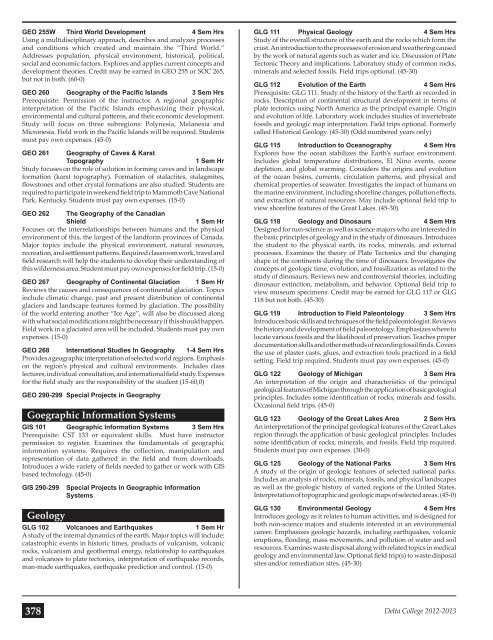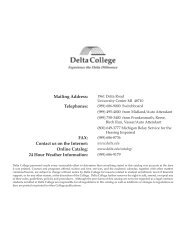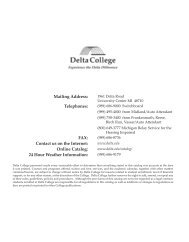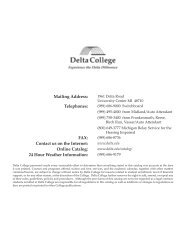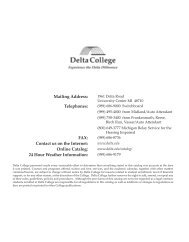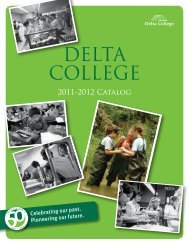2012 - 2013 catalog - Delta College
2012 - 2013 catalog - Delta College
2012 - 2013 catalog - Delta College
Create successful ePaper yourself
Turn your PDF publications into a flip-book with our unique Google optimized e-Paper software.
GEO 255W Third World Development 4 Sem Hrs<br />
Using a multidisciplinary approach, describes and analyzes processes<br />
and conditions which created and maintain the “Third World.”<br />
Addresses population, physical environment, historical, political,<br />
social and economic factors. Explores and applies current concepts and<br />
development theories. Credit may be earned in GEO 255 or SOC 265,<br />
but not in both. (60-0)<br />
GEO 260 Geography of the Pacific Islands 3 Sem Hrs<br />
Prerequisite: Permission of the instructor. A regional geographic<br />
interpretation of the Pacific Islands emphasizing their physical,<br />
environmental and cultural patterns, and their economic development.<br />
Study will focus on three subregions: Polynesia, Melanesia and<br />
Micronesia. Field work in the Pacific Islands will be required. Students<br />
must pay own expenses. (45-0)<br />
GEO 261 Geography of Caves & Karst<br />
Topography<br />
1 Sem Hr<br />
Study focuses on the role of solution in forming caves and in landscape<br />
formation (karst topography). Formation of stalactites, stalagmites,<br />
flowstones and other crystal formations are also studied. Students are<br />
required to participate in weekend field trip to Mammoth Cave National<br />
Park, Kentucky. Students must pay own expenses. (15-0)<br />
GEO 262 The Geography of the Canadian<br />
Shield<br />
1 Sem Hr<br />
Focuses on the interrelationships between humans and the physical<br />
environment of this, the largest of the landform provinces of Canada.<br />
Major topics include the physical environment, natural resources,<br />
recreation, and settlement patterns. Required classroom work, travel and<br />
field research will help the students to develop their understanding of<br />
this wilderness area. Student must pay own expenses for field trip. (15-0)<br />
GEO 267 Geography of Continental Glaciation 1 Sem Hr<br />
Reviews the causes and consequences of continental glaciation. Topics<br />
include climatic change, past and present distribution of continental<br />
glaciers and landscape features formed by glaciation. The possibility<br />
of the world entering another “Ice Age”, will also be discussed along<br />
with what social modifications might be necessary if this should happen.<br />
Field work in a glaciated area will be included. Students must pay own<br />
expenses. (15-0)<br />
GEO 268 International Studies In Geography 1-4 Sem Hrs<br />
Provides a geographic interpretation of selected world regions. Emphasis<br />
on the region’s physical and cultural environments. Includes class<br />
lectures, individual consultation, and international field study. Expenses<br />
for the field study are the responsibility of the student (15-60,0)<br />
GEO 290-299 Special Projects in Geography<br />
Goegraphic Information Systems<br />
GIS 101 Geographic Information Systems 3 Sem Hrs<br />
Prerequisite: CST 133 or equivalent skills. Must have instructor<br />
permission to register. Examines the fundamentals of geographic<br />
information systems. Requires the collection, manipulation and<br />
representation of data gathered in the field and from downloads.<br />
Introduces a wide variety of fields needed to gather or work with GIS<br />
based technology. (45-0)<br />
GIS 290-299<br />
Geology<br />
Special Projects in Geographic Information<br />
Systems<br />
GLG 102 Volcanoes and Earthquakes 1 Sem Hr<br />
A study of the internal dynamics of the earth. Major topics will include:<br />
catastrophic events in historic times, products of vulcanism, volcanic<br />
rocks, vulcanism and geothermal energy, relationship to earthquakes<br />
and volcanoes to plate tectonics, interpretation of earthquake records,<br />
man-made earthquakes, earthquake prediction and control. (15-0)<br />
GLG 111 Physical Geology 4 Sem Hrs<br />
Study of the overall structure of the earth and the rocks which form the<br />
crust. An introduction to the processes of erosion and weathering caused<br />
by the work of natural agents such as water and ice. Discussion of Plate<br />
Tectonic Theory and implications. Laboratory study of common rocks,<br />
minerals and selected fossils. Field trips optional. (45-30)<br />
GLG 112 Evolution of the Earth 4 Sem Hrs<br />
Prerequisite: GLG 111. Study of the history of the Earth as recorded in<br />
rocks. Description of continental structural development in terms of<br />
plate tectonics using North America as the principal example. Origin<br />
and evolution of life. Laboratory work includes studies of invertebrate<br />
fossils and geologic map interpretation. Field trips optional. Formerly<br />
called Historical Geology. (45-30) (Odd numbered years only)<br />
GLG 115 Introduction to Oceanography 4 Sem Hrs<br />
Explores how the ocean stabilizes the Earth’s surface environment.<br />
Includes global temperature distributions, El Nino events, ozone<br />
depletion, and global warming. Considers the origins and evolution<br />
of the ocean basins, currents, circulation patterns, and physical and<br />
chemical properties of seawater. Investigates the impact of humans on<br />
the marine environment, including shoreline changes, pollution effects,<br />
and extraction of natural resources. May include optional field trip to<br />
view shoreline features of the Great Lakes. (45-30)<br />
GLG 118 Geology and Dinosaurs 4 Sem Hrs<br />
Designed for non-science as well as science majors who are interested in<br />
the basic principles of geology and in the study of dinosaurs. Introduces<br />
the student to the physical earth, its rocks, minerals, and external<br />
processes. Examines the theory of Plate Tectonics and the changing<br />
shape of the continents during the time of dinosaurs. Investigates the<br />
concepts of geologic time, evolution, and fossilization as related to the<br />
study of dinosaurs. Reviews new and controversial theories, including<br />
dinosaur extinction, metabolism, and behavior. Optional field trip to<br />
view museum specimens. Credit may be earned for GLG 117 or GLG<br />
118 but not both. (45-30)<br />
GLG 119 Introduction to Field Paleontology 3 Sem Hrs<br />
Introduces basic skills and techniques of the field paleontologist. Reviews<br />
the history and development of field paleontology. Emphasizes where to<br />
locate various fossils and the likelihood of preservation. Teaches proper<br />
documentation skills and other methods of recording fossil finds. Covers<br />
the use of plaster casts, glues, and extraction tools practiced in a field<br />
setting. Field trip required. Students must pay own expenses. (45-0)<br />
GLG 122 Geology of Michigan 3 Sem Hrs<br />
An interpretation of the origin and characteristics of the principal<br />
geological features of Michigan through the application of basic geological<br />
principles. Includes some identification of rocks, minerals and fossils.<br />
Occasional field trips. (45-0)<br />
GLG 123 Geology of the Great Lakes Area 2 Sem Hrs<br />
An interpretation of the principal geological features of the Great Lakes<br />
region through the application of basic geological principles. Includes<br />
some identification of rocks, minerals, and fossils. Field trip required.<br />
Students must pay own expenses. (30-0)<br />
GLG 125 Geology of the National Parks 3 Sem Hrs<br />
A study of the origin of geologic features of selected national parks.<br />
Includes an analysis of rocks, minerals, fossils, and physical landscapes<br />
as well as the geologic history of varied regions of the United States.<br />
Interpretation of topographic and geologic maps of selected areas. (45-0)<br />
GLG 130 Environmental Geology 4 Sem Hrs<br />
Introduces geology as it relates to human activities, and is designed for<br />
both non-science majors and students interested in an environmental<br />
career. Emphasizes geologic hazards, including earthquakes, volcanic<br />
eruptions, flooding, mass movements, and pollution of water and soil<br />
resources. Examines waste disposal along with related topics in medical<br />
geology and environmental law. Optional field trip(s) to waste disposal<br />
sites and/or remediation sites. (45-30)<br />
378 <strong>Delta</strong> <strong>College</strong> <strong>2012</strong>-<strong>2013</strong>


